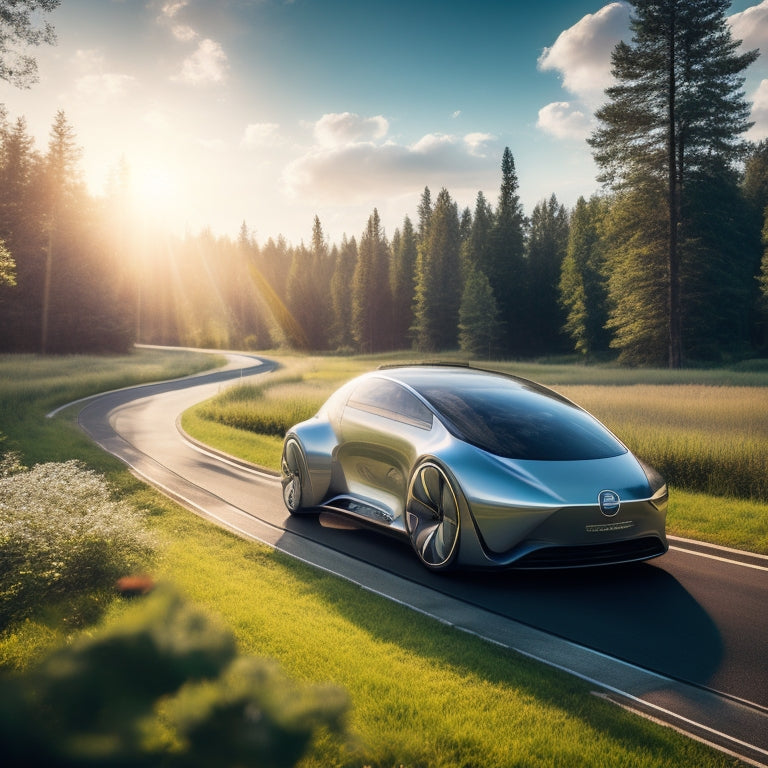
Top Solar Car Conversion Kits for a Greener Ride
Share
You're looking to reduce your carbon footprint with a solar-powered vehicle, and the best solar car conversion kit can help you get there. Industry leaders like Renogy and WindyNation offer high-quality kits with a focus on quality, reliability, and customer support. By harnessing free solar energy, you'll enjoy increased fuel efficiency, noise reduction, and even tax credits and rebates. But before you start, it's crucial to contemplate factors like fleet analysis, hardware testing, and system integration. From there, you can delve deeper into the world of solar-powered vehicles and discover the perfect kit for your greener ride.
Key Takeaways
• Renogy and WindyNation are top brands for solar car conversion kits, offering reliable and high-quality products with excellent customer support.
• Solar-powered vehicles reduce greenhouse gas emissions, offer tax credits and rebates, and provide a smooth, quiet ride with increased fuel efficiency.
• When choosing a solar car conversion kit, consider factors such as fleet analysis, hardware testing, and system integration for a successful installation.
• Look for kits with high-efficiency solar panels, customizable car options, and advanced battery compatibility for optimal performance.
• Before installing a solar car conversion kit, consider the total cost, ongoing expenses, and financial projections to ensure a worthwhile investment.
Top Solar Car Conversion Brands
When shopping for a solar car conversion kit, you'll likely come across several prominent brands that stand out from the rest. These brands have established themselves as industry leaders, and for good reason. They've managed to stay ahead of the curve by keeping up with market trends, investing in customer support, and offering thorough product warranties.
Take, for instance, brands like Renogy and WindyNation, which have built a loyal customer base through their commitment to quality and reliability. Their reputation in the industry is unmatched, and it shows in their sales figures. In fact, industry insights suggest that these brands are leading the charge in the solar car conversion market, with a significant share of the market pie.
What sets them apart, you ask? It's their dedication to providing excellent customer support, robust product warranties, and a focus on innovation that keeps them ahead of the competition.
If you're looking for a reliable and efficient solar car conversion kit, it's worth considering brands that have built a reputation for excellence. After all, you want a brand that's got your back, and these industry leaders fit the bill.
Benefits of Solar Powered Vehicles
By switching to solar powered vehicles, you'll not only reduce your carbon footprint but also enjoy a multitude of benefits that'll make you wonder how you ever managed without them. Here are some of the advantages of going solar:
| Benefits | Description |
|---|---|
| Environmental Impact | Reduce greenhouse gas emissions and contribute to a cleaner environment |
| Government Incentives | Eligible for tax credits, rebates, and other incentives that can help offset the cost of conversion |
| Energy Independence | Harness free energy from the sun, reducing your reliance on fossil fuels |
Not only will you be doing your part for the environment, but you'll also enjoy benefits like increased fuel efficiency, noise reduction, and lower operating costs. Plus, with government incentives, you can offset the cost of conversion and start saving money sooner. By choosing solar powered vehicles, you'll be joining a community of eco-conscious individuals who prioritize the health of our planet. Make the switch today and start reaping the rewards of a greener ride!
How Solar Car Conversion Works
You're probably wondering how to harness the power of the sun to fuel your ride, and that's exactly what we're about to explore.
Converting your car to run on solar energy involves a thoughtful integration of green technology and car mechanics. The conversion process begins with the installation of solar panels on your vehicle's roof or hood, which capture and convert sunlight into electrical energy. This energy is then stored in advanced batteries, designed to optimize power generation and fuel efficiency.
The electric systems in your vehicle are modified to work in harmony with the new solar-powered setup, ensuring a smooth shift. As you drive, the solar panels continuously recharge your batteries, reducing your reliance on traditional fuels and minimizing your carbon footprint.
The result is a vehicle that not only reduces emissions but also improves overall vehicle dynamics, making for a smoother, more enjoyable ride. By embracing solar car conversion, you'll be joining a community of eco-conscious drivers who prioritize the environment without sacrificing performance.
Best Solar Panels for Cars
Selecting the appropriate solar panels for your car is crucial, as they directly impact the efficiency of your solar car conversion, and there are several factors to take into account when choosing the best ones for your vehicle.
When it comes to choosing the best solar panels for your car, you'll want to take into account factors such as solar efficiency, panel durability, and compatibility with your vehicle's electrical system.
Here are some key considerations to keep in mind:
-
Solar Efficiency: Look for panels with high solar efficiency ratings, as they'll convert more sunlight into usable energy.
-
Panel Durability: Choose panels with durable construction, weather-resistant materials, and a long warranty to make sure they'll withstand the elements.
-
Compatibility: Make sure the panels are compatible with your vehicle's electrical system, including the battery type and charging system.
- Certifications: Opt for panels with certifications from reputable organizations, such as UL (Underwriters Laboratories) or IEC (International Electrotechnical Commission), to confirm they meet safety and performance standards.
Electric Vehicle Conversion Process
Now that you've chosen the right solar panels for your car, it's time to tackle the electric vehicle conversion process, which involves several critical steps to guarantee a successful transformation.
The first step is a thorough Vehicle Inspection to identify any potential issues that could affect the conversion. This is important in determining the scope of the project and creating a realistic Conversion Timeline.
Next, you'll need to plan an Electrical Overhaul, which involves replacing your car's traditional engine with electric motors and batteries. This is a complex process that requires careful planning and execution to ensure a smooth and efficient ride.
It's crucial to research and understand the electrical architecture of your vehicle and how it will integrate with your new solar panels.
Solar Car Battery System Components
Your solar car's battery system is made up of several essential components that work together to optimize energy storage and power output. These components are vital for a smooth and efficient ride.
When it comes to energy storage, you'll need a reliable Deep Cycle battery that can handle the demands of your solar car. Deep Cycle batteries are designed to provide a steady flow of energy over a longer period, making them perfect for solar-powered vehicles.
Here are some key components of your solar car's battery system:
-
Battery Management System (BMS): This system monitors and controls the charging and discharging of your batteries, ensuring they operate within a safe and efficient range.
-
Cell Configuration: The arrangement of battery cells affects the overall performance and energy storage capacity of your solar car. A well-designed cell configuration can optimize energy storage and power output.
-
Energy Storage Capacity: The capacity of your battery system determines how far you can travel on a single charge. A higher energy storage capacity means you can go farther without needing to recharge.
- Charging and Monitoring Systems: These systems make sure that your batteries are charged efficiently and safely, while also providing you with real-time monitoring and diagnostics.
Choosing the Right Conversion Kit
When selecting a solar car conversion kit, you'll want to make sure it's compatible with your vehicle and meets your specific needs.
You'll need to verify the kit's compatibility with your car's make and model, as well as analyze the key features that matter most to you, such as power output and installation requirements.
Kit Compatibility Check
To guarantee a seamless solar car conversion, you'll need to verify that the chosen kit is compatible with your vehicle's make, model, and year. This essential step guarantees a hassle-free installation and peak performance.
Before making a purchase, conduct a thorough Vehicle Inspection to identify potential Compatibility Issues. You'll want to take into account factors such as your vehicle's electrical system, battery type, and existing hardware.
Next, assess the kit's System Integration capabilities, ensuring it can smoothly integrate with your vehicle's current systems. Additionally, evaluate the kit's Performance Metrics, such as its energy output and charging speed.
Other vital factors to take into account include:
-
Fleet Analysis: Will the kit be suitable for your specific vehicle type and usage?
-
Hardware Testing: Has the kit undergone rigorous testing to ensure its reliability and durability?
-
Compatibility Issues: Are there any potential conflicts with your vehicle's current systems?
- System Integration: Can the kit integrate with your vehicle's current systems, such as the battery and electrical system?
Key Features Analysis
Having confirmed compatibility, it's time to explore further into the key features of the solar car conversion kit to find the perfect fit for your vehicle. Now, you're ready to analyze the kit's specifications to make sure it meets your needs. Let's immerse ourselves in the essential features to take into account.
First, look for the kit's solar efficiency, which impacts how well it harnesses the sun's energy. A higher solar efficiency rating means more power for your vehicle.
Next, think about car customization options. Do you want a kit that allows for a sleek, aerodynamic design or one that provides ample space for additional features? Consider the type of solar panels, mounts, and wiring configurations that suit your vehicle's unique needs.
Additionally, consider the kit's charging capabilities, battery compatibility, and monitoring systems. Will the kit integrate seamlessly with your vehicle's existing electrical system? Are there any certifications or warranties that guarantee the kit's quality and performance?
Installation and Maintenance Tips
Your solar car conversion kit comes with a detailed installation manual, but before you start, make sure you've established a clean and well-ventilated workspace.
You'll want to gather all the necessary tools and materials beforehand to prevent any last-minute scrambles.
When it comes to installation, keep in mind to:
-
Follow the manual's instructions carefully, and don't hesitate to contact the manufacturer if you're unsure about anything.
-
Keep your Toolbox Essentials handy, including wire strippers, pliers, and screwdrivers, to guarantee a smooth installation process.
-
Take your time, and consider enlisting the help of a friend or a professional if you're not comfortable with the installation process.
- Consider the potential for Roadside Emergencies and plan accordingly, keeping a roadside emergency kit in your car for any unexpected situations.
Cost and ROI Analysis
When calculating the total cost of your solar car conversion kit, you'll need to factor in not only the initial purchase price but also ongoing expenses, such as maintenance and replacement parts, to get an accurate return on investment (ROI) analysis. This thorough approach will help you create realistic financial projections and make informed investment strategies.
As you crunch the numbers, consider the cost of the kit itself, installation fees, and any additional components you might need. Don't forget to account for potential energy savings, which can greatly impact your ROI.
A well-planned solar car conversion kit can pay for itself over time, making it a smart investment for eco-conscious drivers. By factoring in all the expenses and benefits, you'll get a clear picture of your ROI and can make an informed decision about your investment. This careful analysis will help you make the most of your solar car conversion kit and enjoy a greener, more cost-effective ride.
Frequently Asked Questions
Can I Install a Solar Car Conversion Kit on My Own?
'Can you install a solar car conversion kit on your own? Yes, but be prepared for DIY challenges, like complex wiring and electrical connections, and make sure you have the necessary tool requirements, like a multimeter and wire strippers, before diving in.'
Are Solar-Powered Vehicles Compatible With All Vehicle Types?
'Believe it or not, you'll be surprised to know that solar-powered vehicles aren't a one-size-fits-all solution - they're compatible with most vehicle classifications, but it's important to check compatibility before switching to alternative fuels.'
How Long Does a Solar Car Battery Typically Last?
You're wondering how long a solar car battery typically lasts? Well, with proper battery maintenance, you can expect a lifespan of 10-15 years, depending on battery efficiency, charging cycles, and overall care.
Do Solar Car Conversion Kits Void My Vehicle's Warranty?
Will installing a solar car conversion kit void your vehicle's warranty? Hold your breath, because the answer depends on the manufacturer's response. If they deem it an aftermarket alteration, warranty coverage might be compromised, so tread carefully!
Can I Use Solar Power to Charge My Electric Vehicle at Home?
You can definitely use solar power to charge your electric vehicle at home, leveraging off-grid systems to harness renewable energy, and enjoy convenient home charging while reducing your carbon footprint.
Related Posts
-

Why Portable Solar Panels Are a Car Owner's Best Friend
As a car owner, you're likely no stranger to the frustration of a dead battery or a dwindling power supply on a long ...
-

5 Tips for Efficient Last Mile EV Delivery
You're looking to supercharge your last mile EV delivery operations. Start by optimizing your fleet operations to red...
-

Why Are Online Prices for Panels So Low?
When you buy panels online, you're often taking advantage of a combination of factors that drive prices lower. You're...


